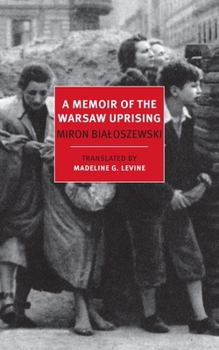A Memoir of the Warsaw Uprising
(Book #3 in the Miron Białoszewski. Utwory zebrane Series)
Select Format
Select Condition 
Book Overview
On August 1, 1944, Miron Bialoszewski, later to gain renown as one of Poland's most innovative poets, went out to run an errand for his mother and ran into history. With Soviet forces on the outskirts... This description may be from another edition of this product.
Format:Paperback
Language:English
ISBN:1590176650
ISBN13:9781590176658
Release Date:October 2015
Publisher:New York Review of Books
Length:288 Pages
Weight:0.68 lbs.
Dimensions:0.6" x 5.0" x 8.0"
Customer Reviews
2 ratings
A Personal Account of the Warsaw Uprising
Published by Thriftbooks.com User , 18 years ago
This was originally written in Polish in 1970. Owing to the fact that the author uses somewhat unorganized narrative, the reader of this book may find it difficult to follow it. There is, however, a helpful glossary (pp. 233-234) of Polish-related allusions. Bialoszewski commonly compares the carnage of the Uprising with that of the original German siege of Warsaw in September 1939. For instance: "When on one day--the 23rd, I think--18,000 shells fell on Warsaw. September 25--that was the decisive day--from morning to night, for twelve hours, Warsaw was bombarded." (p. 80). In common with many authors describing the Warsaw Uprising, Bialoszewski elaborates on the deadly weapons which the Germans had--and against which the Poles had no defense. This includes the Nebelwerfer ("roaring cow", "bellowing cow", "wardrobe", etc.). He comments: "I saw apartment houses which had been uprooted by the `cows', narrow ones, but sometimes four stories high." (pp. 164-165). There were also the giant German artillery pieces: "The `berthas' were the worst. They were, as far as I can remember, three-quarter ton bombs. Three quarters of a ton isn't too bad. Only it was three quarters of a ton of bomb, and straight from the sky, at a slant. I think that was the decisive factor...I'm talking only about the toll among the cellars." (p. 165) Bialoszewski also discusses the evacuation of Warsaw following the capitulation of the Uprising on October 2, 1944. There was astonishment that so many civilians were still alive. In 1946, after the Uprising and the war itself, Bialoszewski personally observed the cremated remains of tens of thousands of Polish civilians who had been murdered by the Germans and their collaborators at Wola (p. 35)
No heros, just poeple trying to survive
Published by Thriftbooks.com User , 28 years ago
Warsaw Uprising from civilians point of view. Everytrhing is in constatnt motion. Simply great






